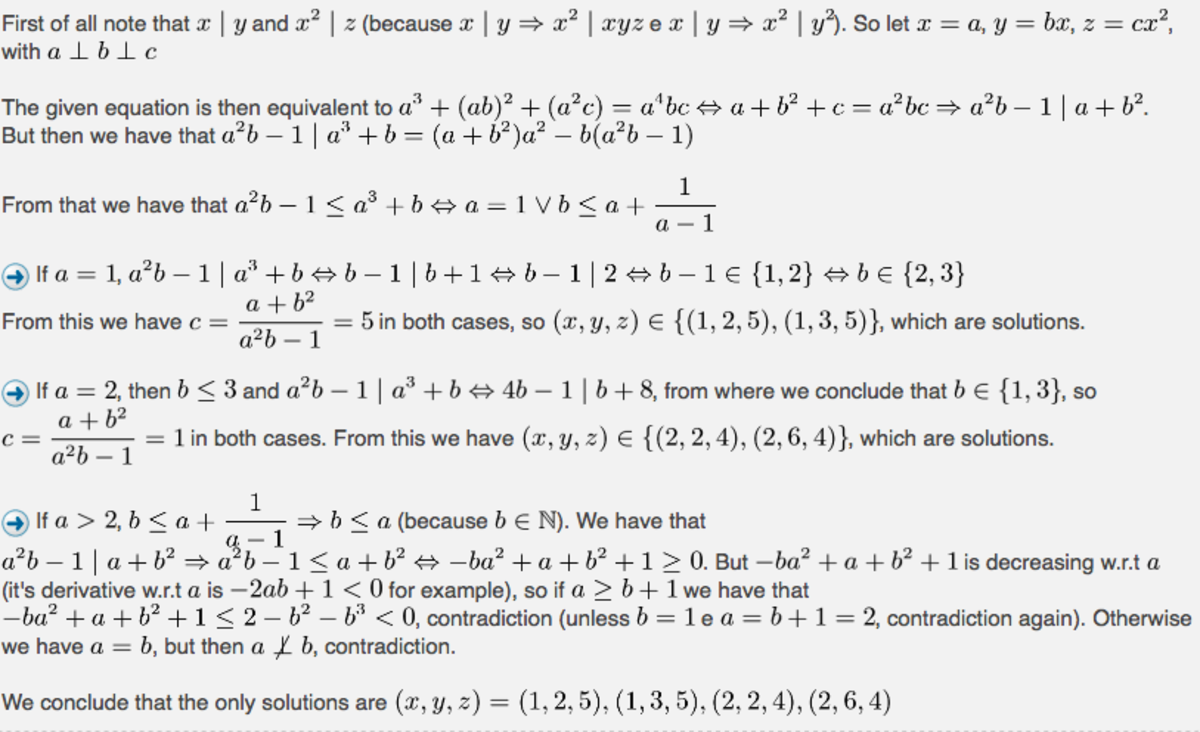To bound or not to bound!
Consider the following diophantine equation in natural numbers x + y 2 + z 3 = x y z where z = g cd ( x , y ) . Let ( x 1 , y 1 , z 1 ) , ( x 2 , y 2 , z 2 ) , . . . , ( x n , y n , z n ) be the all triples which satisfy the equation. Find k = 1 ∑ n ( x k + y k + z k ) .
Details and Assumptions
g cd ( a , b ) is the greatest common divisor of a and b .
This is from IMO1995 shortlist and belongs to this set .
The answer is 37.
This section requires Javascript.
You are seeing this because something didn't load right. We suggest you, (a) try
refreshing the page, (b) enabling javascript if it is disabled on your browser and,
finally, (c)
loading the
non-javascript version of this page
. We're sorry about the hassle.
2 solutions
Really enjoyed the problem! +1!
Log in to reply
Yep, It is a beautiful problem!
Log in to reply
the most beuatifil problem ever seen
I agree too ! Keep up the flow of good questions from your side :)
kazem can you suggest me some nice books for undergraduate(math and physics).
Don't wanna be a party crasher but this is a IMO 1995 suggested problem right?
Log in to reply
Thanks for pointing that out Arian, I saw this once in the third stage of Iran mathematical olympiads, I didn't know that it is an IMO suggested problems.
Thanks for the solution.

Suppose p and q are natural numbers such that x = z p and y = z q . It follows that z p + z 2 q 2 + z 3 = z 3 p q p + z q 2 + z 2 = z 2 p q Therefore z ∣ p and there is a natural number r such that p = r z . Put this in the last equation: r z + z q 2 + z 2 = z 3 r q r + q 2 + z = z 2 r q q 2 − q ( z 2 r ) + ( r + z ) = 0 In order for getting integer values for q , discriminant of the last equation (a quadratic in terms of q ) Δ = ( z 2 r ) 2 − 4 ( r + z ) must be a perfect square, but Δ < ( z 2 r ) 2 Hence Δ ≤ ( z 2 r − 1 ) 2 ( z 2 r ) 2 − 4 ( r + z ) ≤ ( z 2 r − 1 ) 2 1 + 4 ( r + z ) ≥ 2 z 2 r 1 + 4 z ≥ r ( 2 z 2 − 4 ) ≥ 2 z 2 − 4 2 z 2 − 4 z − 5 ≤ 0 As a result z ≤ 2 . So z = 1 or z = 2 . If z = 1 then Δ = r 2 − 4 r − 4 = ( r − 2 ) 2 − 8 Since Δ is a perfect square, difference of two squares are 8 , hence squares are 1 and 9 . So r − 2 = 3 and r = 5 . In this case, 5 + q 2 + 1 = 5 q q 2 − 5 q + 6 = 0 Thus q = 2 or q = 3 which leads to two solutions: ( 5 , 2 , 1 ) , ( 5 , 3 , 1 ) .
If z = 2 then Δ = ( 4 r ) 2 − 4 ( r + 2 ) must be a perfect square, but 4 r 2 − ( r + 2 ) ≤ ( 2 r − 1 ) 2 = 4 r 2 − 4 r + 1 4 r − 1 ≤ r + 2 r ≤ 1 Therefore r = 1 . Now we can write 1 + q 2 + 2 = 4 q q 2 − 4 q + 3 = 0 In conclusion q = 1 or q = 3 which gives us two solutions: ( 4 , 2 , 2 ) , ( 4 , 6 , 2 ) .